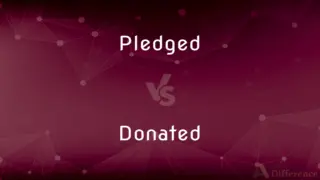Criminal vs. Swat — What's the Difference?
By Tayyaba Rehman & Fiza Rafique — Updated on March 31, 2024
Criminal refers to an individual who commits crimes, while SWAT (Special Weapons And Tactics) is a specialized police unit dealing with high-risk situations.

Difference Between Criminal and Swat
Table of Contents
ADVERTISEMENT
Key Differences
Criminals engage in activities that violate laws, ranging from theft and fraud to violent offenses, posing a threat to public safety and order. SWAT teams, on the other hand, are elite police units trained to handle high-risk operations such as hostage rescues, counter-terrorism, and armed confrontations. These units are equipped with specialized weapons and tactics to neutralize threats and protect civilians.
While criminals operate outside the law, often motivated by personal gain, ideology, or malice, SWAT teams operate within a legal framework, aiming to enforce the law and ensure public safety. SWAT officers undergo rigorous training in firearms, tactics, and crisis negotiation to prepare for the challenges they face in the field.
The relationship between criminals and SWAT teams is inherently adversarial; SWAT teams are often deployed to apprehend dangerous criminals or resolve critical incidents involving criminal activity. This dynamic underscores the broader conflict between law enforcement and those who seek to undermine societal norms and safety.
Criminals vary widely in their methods, motivations, and the severity of their crimes, from petty thieves to organized crime syndicates. SWAT teams, however, maintain a consistent level of professionalism and preparedness, adapting their strategies to different threats while upholding the principles of justice and protection.
Comparison Chart
Definition
An individual who commits crime(s)
A specialized police unit for high-risk situations
ADVERTISEMENT
Primary Role
To engage in illegal activities
To respond to high-risk crimes and situations
Motivation
Personal gain, ideology, etc.
Public safety, law enforcement
Operational Context
Operates outside the law
Operates within legal and procedural frameworks
Skills/Training
Varies widely, often specialized in illegal activities
Extensive training in firearms, tactics, crisis negotiation
Compare with Definitions
Criminal
Operates outside the law.
Criminals often use sophisticated methods to evade capture.
Swat
Aims to ensure public safety.
The swat team successfully rescued the hostages.
Criminal
Faces legal consequences if caught.
The criminal was sentenced to 10 years in prison.
Swat
Specialized police unit for high-risk operations.
The swat team was deployed to handle the hostage situation.
Criminal
Motivations can vary.
Some criminals are driven by desperation, others by greed.
Swat
Responds to a variety of critical incidents.
Swat teams are also involved in counter-terrorism efforts.
Criminal
Can act individually or in groups.
Organized crime syndicates have a hierarchical structure.
Swat
Trained in advanced weapons and tactics.
Swat officers undergo continuous tactical training.
Criminal
An individual who engages in illegal activities.
The criminal was wanted for multiple bank robberies.
Swat
Operates within a legal framework.
Swat operations are carefully planned to minimize risk.
Criminal
Of, involving, or having the nature of crime
Criminal abuse.
Swat
To strike or hit with a sharp blow
Swatted a ball into the outfield.
Criminal
Relating to the administration of penal law.
Swat
To strike or try to strike something with a sharp blow
Swatted at the mosquito.
Criminal
Guilty of crime.
Swat
A sharp blow or hit.
Criminal
Characteristic of a criminal.
Swat
(transitive) To beat off, as insects; to bat, strike, or hit.
He swatted the mosquito that was buzzing around in his bedroom.
The cat swatted at the feather.
Criminal
Shameful; disgraceful
A criminal waste of talent.
Swat
To illegitimately provoke a SWAT assault upon (someone).
Criminal
One that has committed or been legally convicted of a crime.
Swat
A hard stroke, hit or blow, e.g., as part of a spanking.
Criminal
Against the law; forbidden by law.
Swat
Alternate spelling of swot: vigorous study at an educational institution.
Criminal
Guilty of breaking the law.
Swat
To hit, especially with an instrument in the hand; to smack.
Criminal
Of or relating to crime or penal law.
His long criminal record suggests that he is a dangerous man.
Swat
To hit (a baseball) powerfully, and for a long distance.
Criminal
(figuratively) Abhorrent or very undesirable.
Printing such asinine opinions is criminal!
Swat
A sharp blow, especially one made with an instrument in the hand.
Criminal
A person who is guilty of a crime, notably breaking the law.
Swat
A powerful hit, especially a home run.
Criminal
Guilty of crime or sin.
The neglect of any of the relative duties renders us criminal in the sight of God.
Swat
A former state in Northwest India, now a part of Pakistan. It was ruled by a prince called a Wali.
Criminal
Involving a crime; of the nature of a crime; - said of an act or of conduct; as, criminal carelessness.
Foppish and fantastic ornaments are only indications of vice, not criminal in themselves.
Swat
A sharp blow
Criminal
Relating to crime; - opposed to civil; as, the criminal code.
The officers and servants of the crown, violating the personal liberty, or other right of the subject . . . were in some cases liable to criminal process.
Swat
Hit swiftly with a violent blow;
Swat flies
Criminal
One who has commited a crime; especially, one who is found guilty by verdict, confession, or proof; a malefactor; a felon.
Criminal
Someone who has committed (or been legally convicted of) a crime
Criminal
Relating to crime or its punishment;
Criminal court
Criminal
Guilty of crime or serious offense;
Criminal in the sight of God and man
Criminal
Involving or being or having the nature of a crime;
A criminal offense
Criminal abuse
Felonious intent
Common Curiosities
How are criminals prosecuted?
Criminals are prosecuted through the judicial system, facing trials and potential imprisonment.
What are common crimes committed by criminals?
Theft, fraud, assault, and drug trafficking are common crimes.
What is a criminal?
A criminal is an individual who commits acts that violate the law.
How do SWAT teams prepare for operations?
SWAT teams prepare through rigorous training in tactics, firearms, and crisis negotiation.
What does SWAT stand for?
SWAT stands for Special Weapons And Tactics.
What situations require SWAT intervention?
Hostage scenarios, terrorist threats, and armed standoffs require SWAT.
Can criminals be part of organized groups?
Yes, criminals can operate as part of gangs or organized crime syndicates.
What equipment does SWAT use?
SWAT uses specialized gear, including body armor, rifles, and tactical vehicles.
Are all criminals violent?
Not all criminals are violent; some commit non-violent crimes like fraud.
What legal protections exist for accused criminals?
Accused individuals have rights, including legal representation and a fair trial.
What impact do criminals have on society?
Criminal activities can lead to loss, fear, and societal disruption, affecting overall quality of life.
Can someone be falsely accused of being a criminal?
Yes, wrongful accusations can occur, emphasizing the importance of due process.
Do swat teams only operate in the US?
Similar tactical units exist worldwide, though they may have different names.
How does law enforcement track criminals?
Law enforcement uses various investigative methods, including surveillance and informants.
What is the goal of SWAT?
SWAT aims to safely resolve high-risk situations and protect the public.
Share Your Discovery

Previous Comparison
Recently vs. Recent
Next Comparison
Login vs. LogonAuthor Spotlight
Written by
Tayyaba RehmanTayyaba Rehman is a distinguished writer, currently serving as a primary contributor to askdifference.com. As a researcher in semantics and etymology, Tayyaba's passion for the complexity of languages and their distinctions has found a perfect home on the platform. Tayyaba delves into the intricacies of language, distinguishing between commonly confused words and phrases, thereby providing clarity for readers worldwide.
Co-written by
Fiza RafiqueFiza Rafique is a skilled content writer at AskDifference.com, where she meticulously refines and enhances written pieces. Drawing from her vast editorial expertise, Fiza ensures clarity, accuracy, and precision in every article. Passionate about language, she continually seeks to elevate the quality of content for readers worldwide.















































